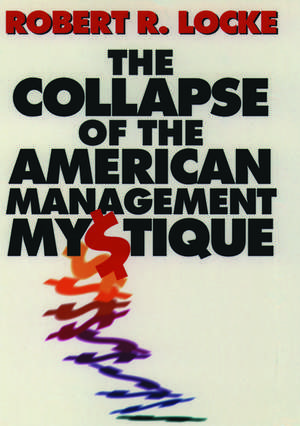The Collapse of the American Management Mystique
Autor Robert R. Lockeen Limba Engleză Hardback – 6 iun 1996
Preț: 326.61 lei
Preț vechi: 469.26 lei
-30% Nou
Puncte Express: 490
Preț estimativ în valută:
62.50€ • 65.47$ • 51.80£
62.50€ • 65.47$ • 51.80£
Carte tipărită la comandă
Livrare economică 29 martie-04 aprilie
Preluare comenzi: 021 569.72.76
Specificații
ISBN-13: 9780198774068
ISBN-10: 0198774060
Pagini: 368
Ilustrații: tables
Dimensiuni: 163 x 243 x 26 mm
Greutate: 0.72 kg
Ediția:New.
Editura: OUP OXFORD
Colecția OUP Oxford
Locul publicării:Oxford, United Kingdom
ISBN-10: 0198774060
Pagini: 368
Ilustrații: tables
Dimensiuni: 163 x 243 x 26 mm
Greutate: 0.72 kg
Ediția:New.
Editura: OUP OXFORD
Colecția OUP Oxford
Locul publicării:Oxford, United Kingdom
Recenzii
I read this down-sizing of American management with fascination, alarm, and sheer relief. It is high time that the cliché ridden bluff of "a professional, dominant and aggressive career elite" was called, and called with the challenging authority of Locke's scholarship and courage.
Robert Locke demonstrates that history - a subject usually neglected by managers and the business schools which teach them - provides a powerful basis for analysis, generalization and prescription about management ... He is interesting, insightful and informative, and those who are most likely to disagree with him have most need to read him.
Robert Locke's book is a bold venture. Thirty years on it offers a striking riposte to Servan Schreiber's bestseller Le Défi Américain. Is this merely a provocation? No - it is a demystification. The book is something which in the physical sciences would be called a discovery.
Robert Locke demonstrates that history - a subject usually neglected by managers and the business schools which teach them - provides a powerful basis for analysis, generalization and prescription about management ... He is interesting, insightful and informative, and those who are most likely to disagree with him have most need to read him.
Robert Locke's book is a bold venture. Thirty years on it offers a striking riposte to Servan Schreiber's bestseller Le Défi Américain. Is this merely a provocation? No - it is a demystification. The book is something which in the physical sciences would be called a discovery.
Notă biografică
Robert R. Locke is Professor of History at the University of Hawaii, Manoa, and Visiting Professor in the Department of Economics at the University of Reading. He is the author of several books on comparative management and business education, including The End of Practical Man: Entrepreneurship and Higher Education in Germany, France and Great Britain 1880-1940 (Jai Press, 1984) and Management and Higher Education since 1940: The Influence of America and Japan on West Germany, Great Britain and France (CUP, 1989).













